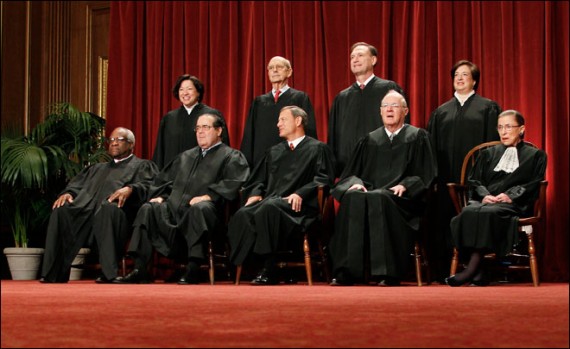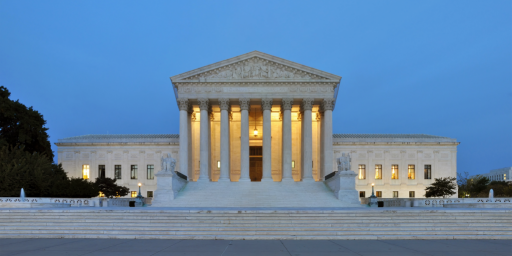Previewing A Busy June For The Supreme Court
Starting tomorrow, we can expect to see the Supreme Court hand down decisions in some of its most high profile cases. Here's a preview.
Starting tomorrow, the Supreme Court heads into the last month of it’s October 2014 term. As has been the case, it will also beginning of a month in which the Justices will hand down its decisions in some of the most high-profile and controversial cases that have been put before them over the course of the past years. Last June saw the release of opinions on issues such as the nature of the President’s power to make recess appointments, the application of the Fourth Amendment to information continued on cell phones and smartphones, the reach of copyright law, and, of course, the Hobby Lobby decision. This year, we will likely see decisions in cases involving issues ranging from the limits of of free speech online and the death penalty to the extent of Congressional power over foreign policy and, of course, same-sex marriage. As has been the standard practice, it’s likely that most of the highest profile cases, such as Obergefell v. Hodges the same-sex marriage cases, will not be released until the final day of the Court’s term, currently scheduled for June 29th. Between now and then, though, the Justices are scheduled to take the bench at least once a week, every Monday starting tomorrow, to announce whatever opinions may be ready at a given time. While there have already been some high profile decisions handed down, the majority of the cases that the general public has been paying attention to, or is likely to have an interest in, will be handed down over the course of the next month. As was the case last year there are roughly 25-30 cases in which opinions have yet to be issued, so it’s likely that the Justices will add additional decision days to the calendar as needed, although that is entirely up to them and we cannot know in advance which opinions will be issued on a given day.
Here’s a summary of some of the more high profile cases that are likely to me the news over the next month.
Zivotofsky v. Kerry
This case involves a 2002 law passed by Congress over the objections of the Bush Administration which requires the State Department to list Israel as the place of birth for any American citizen who was born in Jerusalem. At the time the law was signed, President Bush said that it “impermissibly interferes with the president’s constitutional aauthority to conduct the nation’s foreign affairs and to supervise the unitary executive branch.” Menachem Zivotofsky is an American citizen who was born in Jerusalem and when his parents applied for a passport in his name, the State Department declined to list his place of birth as “Jerusalem, Israel” as required by law. This case was previously before the Supreme Court two years ago after it had been dismissed by lower level Federal Courts based on the “political question” doctrine. The Justices ultimately ruled that the Federal Courts should hear the cases on its merits, so it went back for further proceedings at which the Zivtofsky’s also lost on the merits. In the oral arguments in April, the Justices seemed to be looking for some kind of middle ground, but it’s hard to see where one exists and, as I wrote when this case was accepted by the Court the first time it seems that the State Department has the better argument here. Since this case has been pending since November, an opinion could come down as soon as tomorrow.
The SCOTUSBlog page on Zivotofsky v. Kerry can be found here.
Elonis v. United States
In Elonis, the Court is being asked to determine when, if ever, language that could under some circumstances be interpreted as a threat crosses the line into the area of unprotected speech if it is speech that is made online and not necessarily directed at a specific person. Anthony Elonis was convicted of making threats online related to postings he made regarding former co-workers and his ex-wife which he contends were merely fantasies that included language that was borrowed verbatim from rap lyrics. The legal question before the Court involves the issues of whether or not his postings on Facebook constituted the kind of “true threats” that the Court has previously ruled are not entitled to First Amendment protection and which can prosecuted as Mr. Elonis was. In the oral arguments of this case in December, the Justices seemed skeptical of the government’s arguments and skeptical of the idea that they could draw the kind of distinctions that would have to be made between Elonis’s presumably unprotected speech, to accept the government’s argument, and speech worthy of protection. Given the recent record of this Court of coming down on the side of the First Amendment even when it involves offensive speech, it will be interesting to see how they deal with this case.
Previous posts on this case can be found here, here, and here, and the SCOTUSBlog page for Elonis v. United States can be found here.
Arizona State Legislature v. Arizona Independent Redistricting Commission
This case involves a challenge by members of the Arizona Legislature to the mechanism for drawing state and congressional districts that was established by Proposition 106, which was passed by Arizona voters in 2000 with 56 percent of the vote. Under the plan that this referendum established, the task of establishing the boundaries for these districts was put in the hands of an independent commission with no connection to the legislature. Members of the state legislature sued contending that the scheme violates the provisions in the Constitution which grants the authority for establishing most rules regarding elections to the state’s legislature. The commission contends that the definition of “legislature” in the Constitution was broad enough to include an independent commission established by voters in a referendum. During oral argument of this case in March, the Court was sharply divided but there appeared to be a majority that was skeptical of the constitutionality of the Arizona commission, something that both Lyle Denniston and election law expert Rick Hasen agreed on. This case has been closely watched nationwide because of the implications it could have on efforts in others states to reform the process of redistricting.
The SCOTUSBlog page for Arizona State Legislature v. Arizona Independent Redistricting Commission can be found here.
Walker v. Sons of Confederate Veterans
This case involves the refusal of the State of Texas to issue a specialty license plate bearing a representation of the Confederate Battle Flag under the sponsorship of the Sons of Confederate Veterans. Previously, in Wooley v. Maynard. the Court has decided that First Amendment issues do extend to license plates such that a person who had a religious objection to New Hampshire’s “Live Free Or Die” motto could not be forced to use a license plate that had that message. The SCV’s case builds on that decision and other cases that the Court has decided in intervening years to argue that the refusal to issue a specialty plate in their name is a restriction of speech based on content in violation of the First Amendment. The State of Texas contends that license plates constitute “government speech” and that the state has the authority and discretion to decline to issue plates that convey messages that may be deemed to be offensive. In the oral argument on this case in March, it seemed apparent that the Justices were not very convinced by that argument, but it was unclear just how they could or would define the scope of an individual’s First Amendment rights in a specialty license plate issued by the state.
My previous post on this case can be found here, and the SCOTUSBlog page for Walker v. Sons of Confederate Veterans can be found here.
Horne v. United States Department of Agriculture
This case involves a challenge by a group of California raisin growers who object to a program that dates back to the New Deal that was intended to prop up the price of farm products. Specifically, the farmers are required to participate in a program that, among other things, requires them to surrender up to one-third of their annual raisin crop to the government without compensation rather than selling it on the open market. The purpose of the program is to artificially restrict the supply of raisins, and thus artificially raises the price. The farmers contend that the program violates their rights under the Takings Clause of the Fifth Amendment because it involves a taking of property without just compensation. Reading the summaries of the oral argument in this case, it’s difficult to determine exactly which way the Court is swinging on this case, but there does seem like there could be a majority in favor of the Plaintiff’s position. If that’s how the case turns out, it could have some very interesting implications for other regulatory practices that could also arguably be considered takings for purposes of the Fifth Amendment.
The SCOTUSBlog page for Horne v. United States Department Of Agriculture can be found here.
Glossip v. Gross
This case involves a lawsuit brought by three inmates sitting on death row against the method that state uses to execute people by lethal injection. As with most states who employ this method of execution, Oklahoma uses a three drug “cocktail” to complete the process. The first drug is supposed to render the inmate unconscious and unable to sense what is happening to them. The second drug is a paralytic agent that halts muscle activity. The final drug is a toxic substance that actually does the killing. There is, however, a significant amount of disgareement among scientists about whether or not the first drug actually does render a person unconscious and unable to sense their surroundings, which in theory would mean that an inmate could be awake and aware of what it happening while the lethal drug does its work. This would generally be considered cruel and unusual punishment under the Eighth Amendment. Additionally, as we have seen in both Oklahoma and in other states there have been several cases of botched executions where the drugs did not work as anticipated and inmates were witnessed to suffer extreme pain and suffering. Based on the summary of the oral argument in this case from Lyle Denniston and Amy Howe, it does not appear that the Oklahoma inmates have much hope that the Justices will intervene here, but whatever the outcome is, it will have a huge impact on the nation’s ongoing death penalty debate.
The SCOTUSBlog page for Glossip v. Gross can be found here.
King v. Burwell
The Affordable Care Act has been before the Supreme Court twice already in the five years that it has been law. First, of course, there were the multiple challenges filed by states, private companies, and individuals contending that the law’s health insurance mandate was unconstitutional. While the Plaintiffs did manage to convince a majority of the Court that the mandate could not be justified under the Commerce Clause, the law was ultimately upheld under Congress’s Taxing Power thanks to Chief Justice Roberts. Last year, the Court ruled that the mandate requiring all employers to provide coverage for contraceptives violated the rights of religious employers protected under the Religious Freedom Restoration Act, a decision that remains as controversial on the left as the 2012 decision was on the right. Now, the Court is being asked to perform the often mundane duty of statutory interpretation to determine if the subsidies that the law provides are available to everyone who purchases insurance on an exchange, or only to those who purchase insurance in an exchange established by one of the states. After the oral argument of this case in March, the Court appeared divided on what the proper interpretation of the law ought to be and the extent to which Congressional intent should override plain statutory language. Both Lyle Denniston and Amy Howe came to the same conclusion, and it appears that this is one of those cases where we’ll be looking at 5-4 result.
If the Supreme Court sides with the Plaintiffs in this case, it would mean that several million people at least will not be entitled to subsidies unless Congress does something to fix the legislative language. Polling has indicated that the vast majority of Americans believe that Congress should fix the statute to provide subsidies for all the intended consumers, though, and even many Republicans have argued in favor of at least a temporary fix to the law to continue the subsidies at least through the end of the Obama Administration. What seems clear, though, is that if Congress doesn’t act in this situation then it will become a big issue in the 2016 election, and one that won’t help the GOP at all.
The SCOTUSBlog page for King v. Burwell can be found here.
Obergefell v. Hodges
This is, of course, the same-sex marriage case. It is likely to be the last opinion the court issues next month and likely to be the case that defines the Court’s entire term, if not the Roberts Court as a whole. There really isn’t a whole lot that can said about this issue that hasn’t already been said multiple times over the past two years that same-sex marriage cases have been making their way through the legal system in the wake of the Supreme Court’s decision in United States v. Windsor. The summaries of the Court’s oral argument on this case and its companions in April, such as that from Amy Howe, described the Court as “divided,” but that is to be expected given the sharp divisions that we’ve seen on this issue over the past several years. The key, as it has been in several cases dealing with gay rights reaching back more than a decade, is Justice Anthony Kennedy and in that regard Buzzfeed’s Chris Geidner noted that the Justice seemed to be far more sympathetic to the arguments of the Plaintiffs than the arguments of the states. He also suggests the idea, which I’ve thought possible for some time, that Chief Justice Roberts will ultimately join the majority to make it a 6-3 opinion. While one should always be prepared for the possibility of anything happening, the expectation from nearly every experienced Court watcher that I’ve seen is that the Justices will find that the Fourteenth Amendment bars states from denying gays and lesbians the right to marry.
The SCOTUSBlog page for Obergefell v. Hodges can be found here.
The fun starts tomorrow at 10am. SCOTUSBlog will be live-blogging each decision day, and I’ll be covering the cases here at OTB.







This is that magical time of year where we can stop asking ourselves “What would Ruth Bader Ginsburg do?” and just watch and find out.
If the Sons of Confederate Veterans wins, I look forward to an era of novelty license plates for Nazis, the KKK, NAMBLA, and Bronies.
@Gustopher: You’re bright enough to see that. We’ll soon see if Kennedy and Roberts are.
Bronies? I had to go to Urban Dictionary.
I think I’ve stumbled across an amazing kicker to such a decision.
There is one state in the union (as best I can determine) where the following hold:
1. Common law marriage is still permitted for citizens 18 years of age or older
2. The language describing the requirements for a valid common law marriage is gender neutral (e.g. does not refer to “man and wife” or “husband and wife” or “opposite sexes”)
3. The cohabitation requirement has no minimum duration — in theory one night will do.
That state is… Texas.
The requirements are an agreement to be married, followed by cohabitation in the state of Texas and representation to others in the state of Texas that you are married. That’s it.
If the Supreme Court rules that prohibition of same-sex marriage is illegal, as I read the law (though I Am Not a Lawyer) two days later every same sex couple in Texas who want to be married… are.
Thank you, sir, for the run-down.
@gVOR08:
And now you’re s a sadder man for knowing the truth.
@DrDaveT:
I’m relieved that you took the time to spell out I Am Not A Lawyer. The shorthand – IANAL – sounds too much like a promise.
@michael reynolds: It could also work on a specialty license plate.
I guess we will finally find out if the Moops really did invade Spain.
Don’t care much about anything but the last two cases. I’m glad that things look good for a liberal victory in both of those.